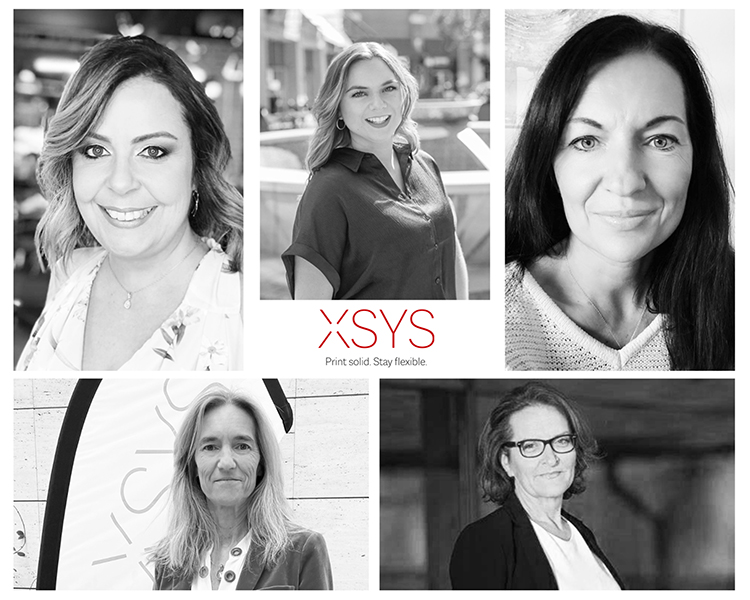Redacción Alabrent
Predominantly male industries are generally defined as those where women account for 25% or less of the workforce. This includes the manufacturing and chemical industries where significantly fewer women are employed than men. Many complex reasons lie behind these low numbers which naturally vary across the globe due to cultural and religious differences.Bringing more women into the company is a major focus for XSYS whose management team is actively working towards increasing the proportion of female employees at all levels. CEO Dagmar Schmidt said, “As part of our goal to reach higher levels of diversity and inclusion, we are keen on putting more women in leadership roles. One of our KPIs is to have 36% women in managerial positions by 2025, and I’m pleased to say that we are currently tracking at 33–34%, so we may well exceed that number. However, we can only promote women into these positions if enough are entering the industry in the first place, so recruitment of women at entry level is critical.”
Across the organization, women account for around 17% of the total workforce; a number which is set to grow as XSYS continues to implement more initiatives to address this imbalance. However, finding candidates is not easy. Dagmar Schmidt explained, “We have to face the fact that we work in a very conservative specialty chemicals industry, which in addition to being male dominated is also, unfortunately, over aged. Recruiting new generations of women is very difficult but it is also very important, both to get a better balance and better representation, but also to secure the future of the industry.”
Increasing the percentage of women in the workforce can be beneficial in many ways for the company as a whole as well as for the employees. Katja Stuhr, HR Director at XSYS, shared her experience, saying, “I appreciate being part of a technical organization where women increasingly play a bigger role – be that in management positions or on the shop floor. I have the feeling that men value what women have to say, as we bring different skills, new perspectives and more empathy to the business.”
Ana Lúcia Bruno Ribeiro works as Sales & Marketing Support in Brazil, where she is part of a small team. She said, “I have worked in the packaging industry for many years; first in reprographics then in software and now with XSYS, and it is true that it is a man’s world, but in my experience, fitting in is all about building good relationships with your colleagues and the clients, so they know you are capable and an equal partner, not about your gender.”
A new female recruit is Kiersten Borden, who started as Inside Sales Specialist in the XSYS North America team in 2021. With a degree in Graphic Communications from Clemson University, she decided that print would be a great choice. “At the time I knew nothing about the industry, but ultimately, I decided to lean into printing over design because I felt the industry was so unique and specialized. I thought I might have more success with finding a job and growing my career along the way. I also liked the technical aspect and found that I really enjoyed some of the challenges and critical thinking that comes with flexo printing specifically.”
She continued, “The whole sales team has been very supportive right from the start. They are all male and have been in the industry for a while. I actually think they were excited to add a woman to the group; someone who is new to the industry and who adds diversity and a fresh perspective to the team. I think it’s important to have different strengths and skills contributing to a team and to the organization as a whole.”
Initiatives both inside and outside the workplace, such as industry associations, networking events, and mentoring schemes, are helpful in addressing the difficult challenge of enticing more women to work in flexo. They also serve to support women by giving them a sounding board and a place to share any concerns.
One such place is Women of Flexo, a special interest group within the Flexographic Technical Association (FTA) in the US. Set up as a space for women to connect, membership is offered to those working in the pressroom, prepress department, sales roles, management and other positions. Kiersten is an active member of the group. “It’s important to network and relate over shared experiences and the challenges that we might face in this industry,” she said. “At our event in Atlanta last week, there were presentations covering topics such as dealing with difficult personalities, how to thrive in a male-dominated industry, and your path to upskilling. And I’m excited to say that I myself gave a talk on ways to overcome ‘impostor syndrome’ in the workplace.”
Marina Altayo-Armengol, who is XSYS Sales Director for Southern Europe, took over the presidency of the Spanish Graphispack Association in 2021, after being part of the steering committee for eight years. “The shared experience brings value to everyone in the industry – to the individual, to the company and to the industry as a whole; this is true for both men and women,” she commented. “But of course, I’m used to being surrounded by businessmen, so it is quite interesting being the first female president, especially in southern Europe which has traditionally been dominated by men.”
As the proportion of female employees grows, companies are also seeing a push for more flexible working conditions. Katja Stuhr added, “If companies are more adaptable, offering hybrid working or more flexible hours, then I think more women can be motivated to work in the industry. However, we are facing a challenging market for both candidates and employers and it is difficult to fill vacancies in general. There is a lot of work to be done in recruitment and employee retention.”
Dagmar Schmidt concluded, “We’re very serious about improving the statistics and getting more women into positions that are traditionally seen as ‘male’ and to offer an environment that ensures they want to stay, because we believe it is fundamental to the company culture and the overall success of XSYS.”



